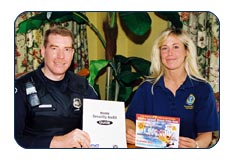|
Our Programs
If we offer programs or services, we'll include a list of them
here.
Crime Reports of the City of Ottawa
This is the website
Crime Reports for the City of Ottawa. All up-to-date reports.
When you get to the site, type this:
Home Security Inspection Program

Home security inspections allow community members to take an active role in making their homes less susceptible
to criminal activity. Based on proven crime prevention principles, residents learn how to make their homes safer.
At your request, police representatives visit your home (house, condo, apartment, etc.) to provide a safety audit
- assessing ways to make your home safer. The audit is based on a checklist, and participants are provided with a booklet
that identifies safety improvements, provides crime prevention tips and promotes other crime prevention initiatives offered
by the Police Service.
Contact your local Community Police Centres to schedule your home security inspection.
Child Print Program
Child Print provides families with practical information should a child go missing. The Child Print program
strives to make communities safer for children, and teaches children and adults street safety tips. Education is the first
step to safety.
Interested parents or guardians are encouraged to visit their local Community Police Centre to get a copy of the Child Print booklet and have their child or children fingerprinted by a Police Centre representative. Parents/guardians are encouraged
to keep an up-to-date record of each child that includes fingerprints, recent photograph and descriptive details, as well
as the names and phone numbers of the family doctor, dentist and friends. The program - often available at community events
across the city - is a great way for children to make positive contact with police and learn valuable prevention and street
proofing tips.
Download our Child Print Book and our Child Print Bookmark
Safety in our city
Ottawa is regarded by many as one of the safest cities in the world, but that's no reason for parents to let their
guard down. Common sense tells us that the streets of any city are not entirely safe - this is particularly true for children.
The Ottawa Police Service will always be available to respond to crime, but we need your active participation to help prevent
crime. The police can't do it alone - get informed, get involved and make crime prevention part of your everyday life. Together,
we can continue to build a safer Ottawa for all.
Would your child know what to do if…
- She got lost at the shopping mall?
- A friendly stranger offered him a ride home?
- She's being bullied at school?
- The babysitter, a neighbour or relative wanted him to play a secret game?
- A friend dared her to drink some beer or smoke a joint?
- He came across some offensive material on the Internet?
These are some of the most common concerns voiced by Ottawa parents and guardians. While it's difficult to teach
children how to balance trust with caution, kids need to know common sense rules that can help keep them safe.
The following safety tips provide a good start for creating awareness and building the self-confidence your child
may need to handle an emergency. Contact your local Community Police Centre for additional crime prevention tips.
Start with the basics
- Make sure your children know their full name, age, address and telephone number with area code. Always have them
carry identification in their pocket (i.e., not visible).
- Be sure they know how to contact you in an emergency, as well as how and when to call 9-1-1 to reach emergency
services (police, fire or ambulance).
- Provide your children with a secret password and tell them never to accompany any stranger, to any place, unless
the stranger provides them with this password. This will ensure that the stranger has acquired your permission to pick up
the child.
- Teach your children to go to a store clerk, security guard or police officer if they are lost in a store or on
the street.
- Set a good example with your own actions - always lock doors and windows and see who's there before opening the
door.
- Listen carefully to your children's fears and feelings about places, people or experiences that make them feel
scared or uneasy. Encourage them to trust their instincts.
At school and play
- Encourage your children to walk to and play at school with friends - not alone. Make sure they are taking the
safest routes, and that they know where to go for help.
- Teach your children to settle arguments with words, not fists, and to walk away when others are arguing. Remind
them that taunting and teasing can hurt friends and make enemies.
- Tell your child to stay away from strangers - especially those who hang around playgrounds, schoolyards or public
restrooms.
- Always check out daycare providers, babysitters, after-school programs, etc. and discuss your child safety and
crime prevention expectations.
- Teach your children that no one - not even a teacher, coach or close relative - has the right to touch them in
a way that makes them feel uncomfortable, and that it's okay to say no, get away and tell a trusted adult.
- Encourage kids to be alert and to tell a trusted adult - you, a teacher, a neighbour, a police officer - about
anything they see that doesn't seem quite right.
At home
- Teach your child what to do if they're home alone (e.g., to never let anyone in without your permission, never
tell someone they are alone, etc.), and agree on rules for having friends over or for going to a friend's house when no adult
is present.
- Talk to your child about the challenges they will face in the community (e.g., drugs, alcohol, vandalism, etc.)
and help them develop strategies around saying no to peers or bullies.
- Monitor your children when they're on-line and monitor the amount of time they spend on-line. The best tool your
child has for screening on-line material is his or her brain - teach them what is acceptable and how to deal with matters
such as exploitation, pornography, excessive violence, hate literature and any other issue of concern to you.
- Let your child know that he or she can tell you anything, and that you'll be supportive.
- It's important that kids know its okay to keep telling if they are uncomfortable - it may take more than one telling
for parents or guardians to understand that inappropriate behaviour is occurring and take appropriate action.
- Be alert for changes in your child's behaviour that could signal abuse, such as sudden secretiveness, withdrawal
from activities, unexplained cash or expensive items, refusal to go to school or a favourite activity, increased anxiety or
unexplained hostility toward a particular person or place.
Other tips and resources
- If your child is a victim of any crime - from stolen lunch money to sexual abuse - don't blame him or her. Listen,
offer sympathy and report it to the proper authority.
- If your child goes missing:
- make a careful search of your home and surrounding properties;
- check favourite play areas;
- phone friends and relatives;
- call police and be prepared to provide a full description.
- Take advantage of or get involved in existing Ottawa Police crime prevention programs like Neighbourhood Watch, Child Print, Home Security Inspections or Operation Identification.
|
